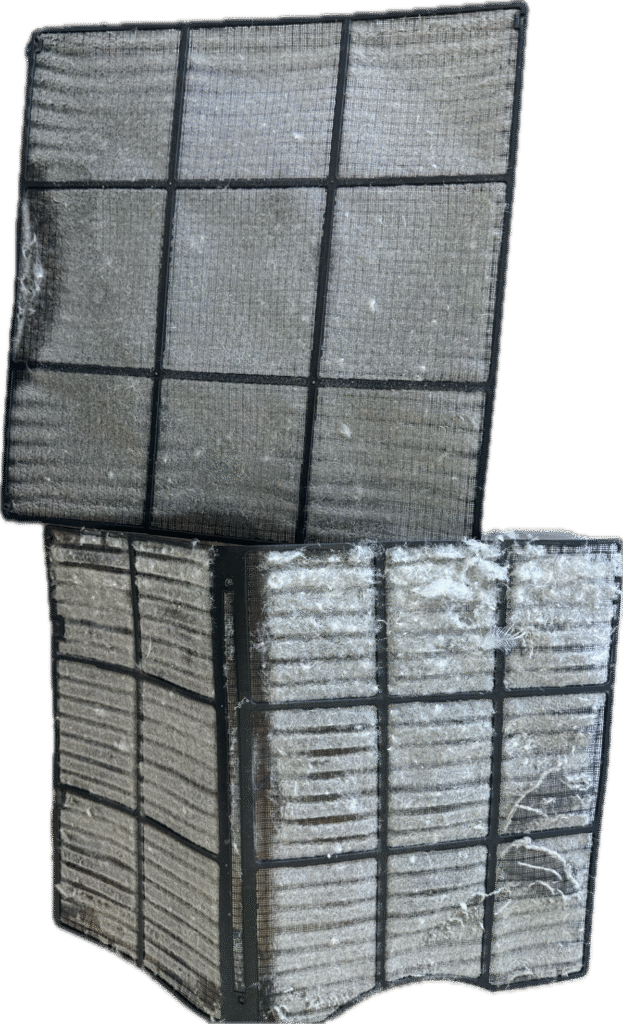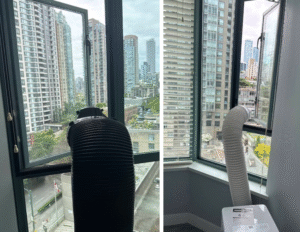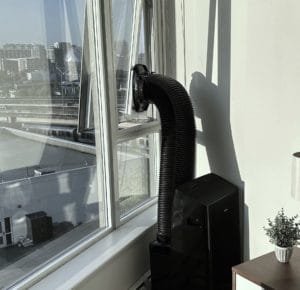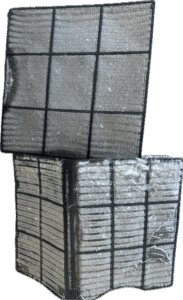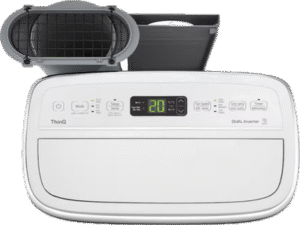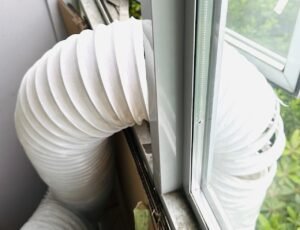If your portable air conditioner isn’t cooling the room like it used to — or suddenly shuts off for no reason — dust buildup might be the silent culprit. Most portable AC users don’t realize how critical clean air filters are until something goes wrong.
One hidden benefit of using a portable AC is that it also acts as a giant dust filter — pulling in particles from the air and trapping them in its filters. But when those filters get clogged, the system can’t breathe, and problems begin to stack up quickly.
Every portable AC has at least two filters: a top filter for air intake, and a lower filter that protects the compressor. When these filters get clogged with dust and pet hair, airflow becomes restricted. That restriction creates heat — and lots of it.
If you don’t clean portable air conditioner filters regularly, your unit will struggle to cool and may overheat.
At Aircon Rescue, we’ve seen dirty filters lead to:
- Overheating and sudden shutdowns
- Melted adhesive on window panels or frames
- Internal component damage
- Noisier operation and frequent cycling
- AC units that fail years too soon
In this post, we’ll show you:
- How the top and bottom filters work
- What happens when filters aren’t cleaned
- How to clean the filters properly
- Why you should avoid ACs without access to the lower filter
How Your Portable AC Filters Work
Portable air conditioners rely on clean airflow to stay cool, move heat outside, and keep your room comfortable. Two separate filters help make that happen.
Top Filter (Air Intake)
This is the most visible filter, often located on the back or top rear of the unit. Its job is to:
- Capture dust, lint, and pet hair from indoor air
- Protect the evaporator coil and fan blades
- Allow clean air to pass over cooling components
When this filter is dirty, your AC draws in less air and has to work harder — reducing cooling efficiency.
Lower Filter (Compressor Intake)
Located near the base of the unit, the lower filter is often overlooked — but it’s absolutely critical. This filter protects the condenser coil and compressor, which are responsible for releasing heat.
Because it’s closer to the floor, the lower filter tends to collect far more dust, hair, and debris than the top one. In our experience, it’s the biggest culprit when it comes to airflow problems, overheating, and internal damage.
Its job is to:
- Keep dust out of the compressor chamber
- Ensure steady airflow to prevent overheating
- Help the unit expel hot air efficiently
If this filter gets clogged, the internal temperature can rise dramatically — causing adhesive failure and compressor damage.
How to Clean Your Portable AC Filters
Cleaning the filters takes just a few minutes and can make a big difference in performance.
- Turn off and unplug the AC
Always unplug the unit before doing any maintenance. - Remove the filters
Most filters slide or unclip easily from the unit. The top filter is often located behind a plastic cover. The lower filter may be behind a panel near the bottom. - Rinse thoroughly under running water
Use a tap or sink to rinse off dust, lint, and pet hair. No soap is needed — just a gentle rinse is usually enough. Avoid scrubbing or bending the screen. - Let it dry completely
Set the filters aside to air dry fully before reinstalling them. A damp filter can cause mold or mildew to develop inside the unit. - Reinstall filters and plug in the AC
Slide or clip the filters back in place. Make sure they’re properly seated before turning the unit back on.
Tip: Check and clean the filters every two weeks during heavy use, especially if you have pets or live in a dusty environment. Prioritize the lower filter — it will usually be the dirtiest.
What Happens If You Don’t Clean the Filters?
Letting dust build up on your filters might seem harmless — but the consequences are serious and expensive.
1. Overheating
Blocked airflow means your compressor and internal coils can’t cool down. This creates a dangerous heat trap that can cause the unit to shut down — or burn out completely.
2. Adhesive Failure
When heat can’t escape properly, it gets pushed back toward your window and panel. We’ve seen Velcro adhesive melt completely off the window frame or the back of the panel, causing it to come loose and fall out of place.
3. Compressor Burnout
Your compressor is the heart of the AC. Overheating it over time leads to irreversible damage — and most portable ACs aren’t designed to be repaired.
4. Reduced Cooling, Higher Bills, and More Noise
Clogged filters lower performance. Your AC runs longer, cycles more frequently, and draws more power — leading to higher energy bills and louder operation as the compressor works overtime to keep up.
5. Shortened Lifespan
Without proper airflow, even a high-quality unit can fail early. We’ve seen units fail in under two years from simple neglect.
Avoid Portable ACs Without a Removable Lower Filter
Some portable ACs are built with failure in mind. If a unit doesn’t have a removable lower filter, that’s a red flag.
These models may include a lower grill for air intake, but without a removable screen filter, dust goes straight into the condenser coils. Over time, this causes severe internal clogging and heat buildup.
Worse yet, these units are not meant to be opened. Trying to clean the inside usually involves breaking the casing, voiding the warranty, and potentially damaging the unit further.
At Aircon Rescue, we’ve seen these units fail far faster than models with proper filter access. It’s frustrating for the customer — and completely avoidable with the right purchase.
What to Look For:
- A clearly labeled, removable lower filter panel
- Filters that slide or pop out without tools
- Manufacturer instructions for cleaning both filters
Conclusion: Don’t Let Dust Destroy Your AC
A little dust can do a lot of damage.
Cleaning your portable AC’s top and lower filters regularly is one of the easiest ways to protect your investment. It prevents overheating, improves cooling, reduces noise, and adds years to the life of your unit.
Just as important — don’t buy an AC that you can’t maintain. If there’s no access to the lower filter, the coils will clog, heat will build up, and the unit will fail faster than expected.
At Aircon Rescue, we’ve seen firsthand what dust can do. Stay ahead of the problem — and keep your AC running strong all summer long.

